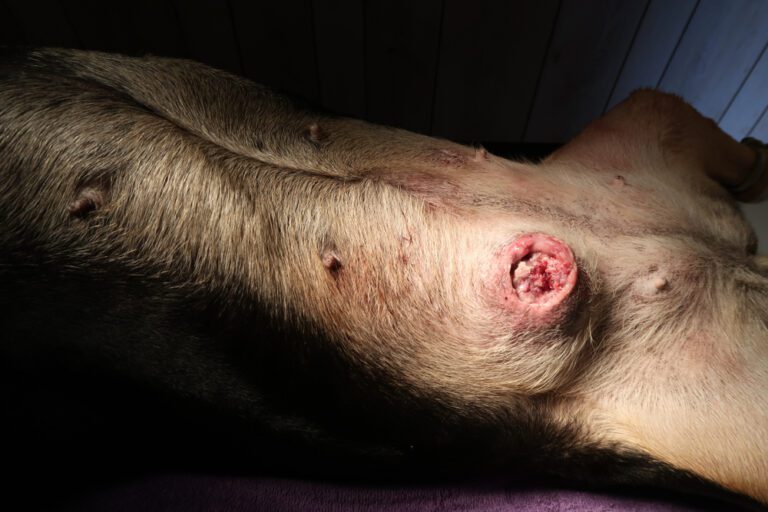Impact of Cancer in Shih Tzus: Latest Research & Treatments
Cancer is a formidable adversary that affects humans and our beloved canine companions, including the charming Shih Tzus. In recent years, there has been a growing concern about the prevalence and impact of cancer in these delightful small dogs. As cherished members of many families, Shih Tzus brings joy and affection, making it all the more distressing when they face health challenges such as cancer.
Understanding the Impact of Cancer in Shih Tzus is vital for pet owners and veterinarians. This article delves into the latest research surrounding cancer in Shih Tzus, shedding light on the various facets of the disease and exploring contemporary treatment options. We empower ourselves to provide the best care possible for our furry friends by staying informed about these developments. Let’s embark on a journey to uncover the current landscape of cancer in Shih Tzus and discover the advancements in research and treatment that offer hope and support to pets and their devoted owners.
The prevalence of cancer in Shih Tzus
Our fluffy friends, the Shih Tzus, bring us joy and companionship. However, beneath their charming exterior, a silent concern lurks – the prevalence of cancer in this beloved breed. Understanding the scope of this challenge is crucial for every Shih Tzu owner, as it empowers us to be proactive in their healthcare.
In the realm of veterinary health, statistics play a pivotal role. Studies reveal that, like many other dog breeds, Shih Tzus can face the unfortunate reality of cancer. The prevalence of cancer in Shih Tzus is a complex puzzle influenced by various factors such as genetics, environment, and overall health. While it might seem disheartening to acknowledge, shedding light on this issue is the first step toward providing the best possible care for our furry companions.
Unlike humans, Shih Tzus can’t tell us when something feels off, making regular check-ups and awareness crucial. It’s not about dwelling on the negative but being proactive and informed. Armed with knowledge, we can detect signs early on, potentially improving outcomes and ensuring a higher quality of life for our Shih Tzus.
As we embark on this journey to understand the prevalence of cancer in Shih Tzus, let’s remember that knowledge is power, and our commitment to the well-being of our furry friends can make a notable difference in their lives. Together, we can navigate the challenges posed by cancer, working towards a future where Shih Tzus can lead happy, healthy lives.

Understanding the types of cancer affecting Shih Tzus
Shih Tzus holds a special place in the intricate tapestry of canine health with its delightful personality and affectionate nature. However, like all living beings, they are not immune to health challenges, including various types of cancer. To be the best companions to our furry friends, it’s essential to delve into the nuances of the types of cancer that may affect Shih Tzus.
- Mast Cell Tumors (MCT): Mast cell tumors are skin cancers that can occur in Shih Tzus. They can vary in appearance and may appear as lumps or bumps on the skin.
- Lymphoma: Lymphoma is a cancer of the lymphatic system, and it can affect various organs in the body. Common signs may include swollen lymph nodes, lethargy, and weight loss.
- Hemangiosarcoma: This cancer arises from the blood vessels and is often found in the spleen or heart. It can be challenging to detect until it reaches an advanced stage.
- Osteosarcoma: Osteosarcoma is a bone cancer that can affect Shih Tzus. It often occurs in the long bones, such as the limbs, and can be very aggressive.
- Melanoma: Melanoma is a type of skin cancer that can affect the pigmented cells in a dog’s skin. It may appear as a dark, irregularly shaped growth on the skin.
- Transitional Cell Carcinoma (TCC): TCC commonly affects the bladder and urinary tract. Signs may include increased frequency of urination, blood in the urine, and difficulty urinating.
- Soft Tissue Sarcoma: Soft tissue sarcomas can develop in various tissues, including muscles, nerves, and connective tissues. They may be existing lumps or swellings.
- Histiocytoma: Histiocytomas are benign tumors that often affect younger dogs, including Shih Tzus. While they are usually not malignant, they can appear as small, firm masses on the skin.
- Squamous Cell Carcinoma: This type of cancer is commonly associated with the skin and can affect areas with sparse hair, such as the nose and ears. It may appear as raised, crusty lesions.
- Thyroid Carcinoma: Thyroid cancer can affect the thyroid glands, leading to issues with metabolism. Signs may include weight gain or loss, changes in appetite, and lethargy.
- Anal Sac Adenocarcinoma: Dogs, including Shih Tzus, can develop cancer in the anal sacs. Signs may include scooting, licking the anal area excessively, and difficulty defecating.
- Brain Tumors: While relatively rare, brain tumors can occur in dogs. Signs may include seizures, disorientation, and changes in behavior.
- Mammary Gland Tumors: Female dogs, especially those not spayed, can develop mammary gland tumors. These tumors can be benign or malignant and are more common in older, unspayed females.
- Testicular Tumors: Intact male dogs can develop testicular tumors. Neutering is a preventive measure for these types of tumors.
- Mouth and Oral Cavity Tumors: Cancer can occur in the oral cavity, including the gums, tongue, and other structures. Signs may include difficulty eating, drooling, and bad breath.
- Pancreatic Cancer: Pancreatic tumors can affect the pancreas, leading to digestive issues and weight loss. Diagnosis may require blood tests and imaging.
- Prostate Cancer: Intact male dogs can develop prostate cancer. Neutering can reduce the risk of this type of cancer.
- Thymoma: Thymomas are tumors that affect the thymus gland near the heart. They can cause respiratory and cardiac issues.
Remember, early detection is vital to successful treatment. If you notice any unusual symptoms or changes in behavior in your Shih Tzu, it’s essential to seek veterinary attention promptly. Regular check-ups and screenings can also help identify potential issues early on. Always consult your veterinarian for specific guidance and advice based on your pet’s health and history.

Latest research in cancer treatment options for Shih Tzus
It’s important to note that treatment decisions are highly individualized, and what works for one dog may not be suitable for another. Veterinary oncologists assess factors such as the type and stage of cancer, the dog’s overall health, and the owner’s preferences when developing a treatment plan.
- Immunotherapy: Immunotherapy is an active research area in human and veterinary medicine. It involves using the body’s immune system to recognize and attack cancer cells. In dogs, this may include vaccines or other immunomodulatory agents.
- Targeted Therapies: Targeted therapies aim to interfere with specific molecules involved in the growth and spread of cancer cells. These treatments are designed to be more precise, minimizing damage to healthy cells. Research is ongoing to identify specific targets for canine cancers.
- Genomic Medicine: Advances in genomic research have led to a better understanding of the genetic basis of cancers. This knowledge could lead to more targeted and personalized treatment approaches based on the specific genetic characteristics of the tumor.
- Chemotherapy: While chemotherapy is a well-established treatment for cancer in dogs, ongoing research focuses on optimizing drug combinations, dosages, and delivery methods to enhance effectiveness while minimizing side effects.
- Nanotechnology in Drug Delivery: Researchers are exploring nanotechnology to enhance drug delivery for cancer treatment. This involves the development of nanoparticles to deliver drugs directly to cancer cells, potentially increasing treatment efficacy while minimizing side effects.
- Cancer Vaccines: Investigational cancer vaccines, including Shih Tzus, are being researched for dogs. These vaccines stimulate the immune system to recognize and target cancer cells more effectively.
- Radiation Therapy Advances: Ongoing research focuses on refining radiation therapy techniques, including intensity-modulated radiation therapy (IMRT) and stereotactic radiation therapy (SRT), to target tumors with greater precision and reduce damage to surrounding healthy tissues.
- Nutraceuticals and Diet Modification: Some studies explore the potential benefits of specific diets or nutraceuticals (nutritional supplements with potential health benefits) in supporting cancer treatment and improving the overall well-being of dogs undergoing cancer therapy.
- Liquid Biopsies: Liquid biopsies involve analyzing blood or other bodily fluids to detect genetic mutations or other markers associated with cancer. This non-invasive approach could help monitor treatment response and detect cancer recurrence earlier.
- Complementary Therapies: Research continues on complementary therapies such as acupuncture, herbal supplements, and other integrative approaches to manage cancer symptoms, improve quality of life, and potentially enhance the effectiveness of traditional treatments.
- Veterinary oncology is rapidly evolving, and new findings are continually emerging. Stay informed about the latest research in cancer treatment for Shih Tzus or any dog breed, consider consulting with a veterinary oncologist, exploring reputable veterinary journals, and keeping an eye on updates from veterinary conferences. Always consult a veterinarian to discuss the most suitable treatment options for your pet based on their specific diagnosis and condition.

Surgical interventions for Shih Tzus with cancer and radiation therapy options for Shih Tzus
Surgical Interventions
1. Tumor Removal (Resection): Surgical tumor removal tumor is a common approach when feasible. The goal is to excise the cancerous with a margin of healthy tissue to reduce the risk of recurrence.
2. Lymph Node Removal: In cases where cancer has spread to nearby lymph nodes, surgical removal may be recommended to prevent further metastasis.
3. Mammary Gland Tumor Removal: Surgical removal of the affected mammary glands may be advised for Shih Tzus with mammary gland tumors, especially in unspayed females.
4. Limb Amputation (Osteosarcoma): In cases of osteosarcoma, which often affects the limbs, amputation of the affected limb may be recommended to alleviate pain and slow the progression of the disease.
Radiation Therapy Options
1. External Beam Radiation: This is a common form of radiation therapy where high-energy beams are directed externally at the tumor. It’s often used when the tumor is localized, and surgery alone may not be sufficient.
2. Stereotactic Radiation Therapy (SRT): SRT is a precise form of radiation therapy that delivers high doses of radiation to a specific target with minimal damage to surrounding healthy tissues. It’s beneficial for small, well-defined tumors.
3. Brachytherapy: This involves placing radioactive sources directly into or near the tumor. It’s commonly used for certain tumors, providing a targeted radiation approach.
4. Palliative Radiation: In cases where a cure may not be possible, palliative radiation therapy can help alleviate symptoms, reduce pain, and improve the quality of life.
5. Combination Therapy: In some cases, surgery and radiation therapy may be recommended to address cancer comprehensively.
It’s crucial to note that the choice of treatment depends on various factors, including the type and stage of cancer, the overall health of the Shih Tzu, and the pet owner’s preferences. Consultation with a veterinary oncologist is essential to determine the most appropriate course of action based on the specific diagnosis and circumstances of your Shih Tzu.
Chemotherapy and radiation therapy in Shih Tzus
Chemotherapy in Shih Tzus
1. Purpose: Chemotherapy is a systemic treatment that uses drugs to target and kill rapidly dividing cancer cells. It can be employed to treat various types of cancer in Shih Tzus.
2. Administration: Chemotherapy drugs can be administered orally, intravenously, or through injections. The frequency and duration of treatment depend on the type and stage of cancer.
3. Monitoring: Regular veterinary check-ups are crucial during chemotherapy to monitor the dog’s response to treatment and manage any potential side effects. The treatment plan may be adjusted based on the individual dog’s reaction.
Radiation Therapy in Shih Tzus
1. Purpose: Radiation therapy uses high-energy beams to target and destroy cancer cells. It can be applied externally or internally, depending on the type and location of the cancer.
2. External Beam Radiation: In this approach, a machine delivers targeted radiation to the affected area from outside the dog’s body. It is commonly used for localized tumors.
3. Internal Radiation (Brachytherapy): This involves placing radioactive sources directly into or near the tumor. Brachytherapy is utilized for certain types of tumors to deliver a focused dose of radiation.
4. Stereotactic Radiation Therapy (SRT): SRT is a precise form of radiation therapy that delivers high doses of radiation to a specific target with minimal damage to surrounding healthy tissues. It is often used for small, well-defined tumors.
5. Palliative Radiation: In cases where a cure may not be achievable, palliative radiation therapy can help alleviate symptoms, reduce pain, and enhance the quality of life.
6. Side Effects: Radiation therapy may cause side effects such as skin irritation, fatigue, and changes in appetite. These effects are generally temporary and can be managed with veterinary supervision.
Consulting with a veterinary oncologist is crucial to determine the most suitable treatment plan for a Shih Tzu with cancer. The choice between chemotherapy and radiation therapy, or a combination of both, depends on the specific type and stage of cancer, as well as the overall health of the dog. Regular monitoring and supportive care are essential to cancer treatment in Shih Tzus.

Palliative care and pain management for Shih Tzus with cancer
1. Purpose of Palliative Care: Palliative care focuses on enhancing the quality of life for Shih Tzus with cancer by managing symptoms and providing com
2. Types of Chemotherapy Drugs: There are different classes of chemotherapy drugs, and a combination of them may be used. These drugs disrupt the cancer cell’s ability to divide and grow.
3. Side Effects: While chemotherapy targets cancer cells, it can also affect rapidly dividing healthy cells, such as bone marrow and gastrointestinal tract. Common side effects in Shih Tzus may include nausea, vomiting, and a temporary white blood cell count decrease.
4. Multidisciplinary Approach: Palliative care often involves a multidisciplinary team, including veterinarians, nurses, and pet owners. The goal is to address physical symptoms and emotional and social aspects of Shih Tzu’s life.
5. Pain and Symptom Management: Palliative care includes the management of pain and other distressing symptoms associated with cancer. Medications, physical therapy, and other interventions may enhance the dog’s comfort.
6. Nutritional Support: Proper nutrition is crucial for Shih Tzus with cancer. Palliative care may involve dietary modifications and nutritional support to ensure the dog receives adequate nutrients.
7. Environmental Adaptations: Adjusting the Shih Tzu’s environment can improve their quality of life. This may include providing a comfortable bed, minimizing stressors, and ensuring easy access to food and water.
Pain Management for Shih Tzus with Cancer
1. Identification of Pain: Recognizing signs of pain in Shih Tzus is essential for effective pain management. Behavioral changes, reluctance to move, changes in eating habits, and vocalizations can indicate discomfort.
2. Pharmacological Interventions: Veterinarians may prescribe pain medications to manage cancer-related pain. These may include non-steroidal anti-inflammatory drugs (NSAIDs), opioids, or other analgesics. Dosages are carefully adjusted based on the dog’s size and individual response.
3. Complementary Therapies: Integrating complementary therapies, such as acupuncture, massage, and physical therapy, can complement traditional pain management strategies and improve the overall well-being of Shih Tzus with cancer.
4. Regular Monitoring: Continuous assessment of the dog’s pain levels is essential to adjust the pain management plan. Regular veterinary check-ups help ensure that the pain management strategy remains effective.
5. Owner Education and Support: Pet owners play a crucial role in the pain management process. Education about recognizing signs of pain, administering medications as prescribed, and providing emotional support to the Shih Tzu is integral to effective pain management.
Palliative care and pain management aim to optimize the quality of life for Shih Tzus with cancer, allowing them to live comfortably and peacefully. Open communication between the veterinarian and pet owner is essential to tailor the approach to the dog’s needs.

The role of nutrition and alternative therapies in cancer management for Shih Tzus
Importance of Nutrition
Proper nutrition is crucial in supporting the overall health and well-being of Shih Tzus with cancer. A balanced and nutrient-rich diet is essential to maintain strength, support the immune system, and manage the side effects of cancer treatments.
Consultation with a Veterinarian: When a Shih Tzu is diagnosed with cancer, it’s essential to consult a veterinarian to create a customized nutrition plan. The plan may be tailored to the specific type of cancer, the dog’s overall health, and any ongoing treatments.
High-Quality Diet: Providing a high-quality, easily digestible diet is essential. Veterinarians may recommend diets that are rich in protein to support muscle maintenance and immune function.
Specialized Diets: In some cases, veterinarians may recommend specialized diets for dogs with cancer. These diets may include specific nutrients to support the dog’s unique nutritional needs during cancer treatment.
Hydration: Ensuring adequate hydration is vital, especially if the Shih Tzu is undergoing treatments such as chemotherapy, which may cause dehydration.
Alternative Therapies in Cancer Management for Shih Tzus
Acupuncture: Acupuncture involves the insertion of thin needles into specific points of the body. It is believed to help alleviate pain and improve overall well-being. Some Shih Tzu owners and veterinarians consider acupuncture a complementary therapy for cancer management.
Herbal Supplements: Certain herbal supplements may complement traditional cancer treatments. However, it’s crucial to consult a veterinarian before introducing herbal supplements, as their safety and efficacy can vary.
Massage Therapy: Massage therapy can contribute to the comfort and relaxation of Shih Tzus with cancer. It may help reduce stress, improve circulation, and enhance overall quality of life.
Physical Therapy: Physical therapy exercises can be beneficial, significantly if cancer or its treatment has affected the dog’s mobility. Physical therapy aims to maintain or improve muscle strength and joint flexibility.
Mind-Body Practices: Practices such as meditation and relaxation techniques may provide emotional support to both the Shih Tzu and the owner during the challenging period of cancer management.
It’s crucial to note that while alternative therapies can complement traditional veterinary care, they should not replace conventional treatments. Always consult with a qualified veterinarian to ensure that any alternative therapies are safe and suitable for the specific needs of the Shih Tzu. Integrating nutrition and alternative therapies should be part of a comprehensive cancer management plan developed in collaboration with veterinary professionals.
Supportive care and emotional well-being of Shih Tzu owners
1. Regular Veterinary Check-ups: Schedule regular veterinary check-ups to monitor the Shih Tzu’s health, assess the effectiveness of treatment, and make any necessary adjustments to the care plan.
2. Pain Management: Work closely with the veterinarian to manage any pain or discomfort the Shih Tzu may be experiencing. Adequate pain management contributes to the dog’s overall well-being.
3. Dietary Support: Follow the veterinarian’s recommendations for a balanced and nutritious diet tailored to the specific needs of the Shih Tzu during cancer management.
4. Hydration: Ensure the Shih Tzu remains adequately hydrated, especially if undergoing treatments that may cause dehydration.
5. Environmental Adaptations: Adjust the Shih Tzu’s living environment to enhance comfort. Provide a cozy bed, minimize stressors, and ensure easy access to food and water.
Emotional Well-being of Shih Tzu Owners:
1. Open Communication: Maintain open and honest communication with the veterinarian. Discuss concerns, ask questions, and seek clarification about the Shih Tzu’s diagnosis, treatment options, and prognosis.
2. Support Groups: Consider joining support groups or online communities where Shih Tzu owners facing similar challenges can share experiences, provide emotional support, and exchange information.
3. Consultation with a Veterinary Oncologist: If applicable, consult a veterinary oncologist specializing in pet cancer treatment. They can offer specialized insights and treatment options tailored to the specific type of cancer.
4. Emotional Support for the Shih Tzu: Provide the Shih Tzu with extra love, attention, and comfort. Dogs can sense their owners’ emotions, and maintaining a calm and reassuring presence can positively impact their emotional state.
5. Consider Professional Counseling: Dealing with a pet’s cancer diagnosis can be emotionally challenging. If needed, seek support from a professional counselor or therapist to cope with the emotional aspects of caring for a Shih Tzu with cancer.
6. Quality Time: Spend quality time with the Shih Tzu doing activities they enjoy. This helps strengthen the bond between the owner and the dog, contributing to emotional well-being.
7. Regular Exercise: Engage the Shih Tzu in gentle and appropriate exercises to maintain mobility and prevent muscle atrophy. Regular exercise can also be beneficial for the owner’s mental well-being.
Remember that supportive care extends beyond physical health to emotional and psychological well-being. Both the Shih Tzu and the owner can benefit from a holistic approach that addresses the challenges of cancer with compassion and understanding. Regular check-ins with the veterinarian and seeking emotional support when needed are essential components of a comprehensive care plan.
Conclusion: The Impact of Cancer in Shih Tzus
The cancer treatment landscape for Shih Tzus is evolving, offering hope for improved outcomes and enhanced well-being. Current approaches, ranging from surgery and chemotherapy to radiation therapy, palliative care, and alternative therapies, showcase a commitment to comprehensive care.
Ongoing research explores innovative treatments such as targeted therapies, immunotherapies, and personalized genetic approaches. These advancements hold promise for more effective, tailored treatments, reflecting the dedication of the veterinary community to advancing cancer care for Shih Tzus.
Integral to this progress is recognizing the importance of supportive care and emotional well-being. Owners and veterinary professionals collaborate to provide holistic care, addressing the physical aspects of cancer treatment and the emotional needs of Shih Tzus and their caretakers.
As we look forward, the synergy between cutting-edge treatments, nutritional support, and emotional care creates a positive outlook for Shih Tzus facing cancer. With continued dedication, research, and collaboration, there is hope for a brighter future, where canine cancer treatments become increasingly influential, allowing Shih Tzus to lead longer, healthier lives surrounded by the love and care they deserve.







